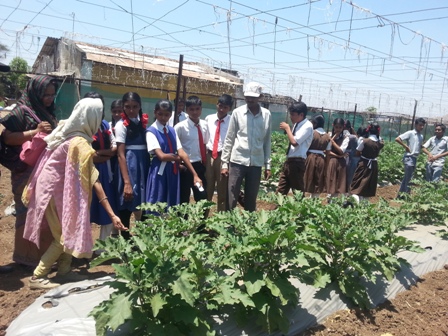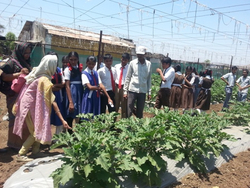Agro-education – A unique platform to create awareness and sensitisation among students

Awareness generation towards farming practices, importance of organic farming and sensitisation towards environmental degradation among school children was the objective behind the day long visit for more than 25 students and teachers from 5 schools in Nashik. The group had been invited to an agricultural farm in the Makhmalabad area which, after discussions with the stakeholders and owing to its intensive grape production and rapid urbanisation, had been chosen as the pilot project implementation area.
On 13 April 2014, as a part of the four pilot projects planned for the city of Nashik under the project ‘Operationalisation of Nexus approaches in Nashik city’, and facilitated by the professors of KK Wagh Agricultural and Engineering College, a group of students, in the age-group 12-14, were taken to a local farm spread within 87 acres with more than 15 varieties of mangoes, cashew nuts and other fruits. The students witnessed various types of water conservation features like terracing, bunding and their specific usage in the farm; at the organic farming site they had a chance to know more about the practical and on-field usage of mulching, organic fertilizers and insect trappers.
The execution of a second pilot project – Agricultural Pump Set Efficiency Performance Evaluation – has also started in March, with an external auditor performing auditing of selected agricultural pumps. Based on the results of his evaluation, further steps will be taken to enhance pump efficiency. The pilot responds to the identified needs for improving agriculture pump efficiency, due to the fact that Nashik is an agro-intensive city, and its farms consume large amounts of pumped water (surface water as well as groundwater).
The mapping and survey of biogas potential, the third pilot in the area, has also been completed; the mapping will be followed by the development of potential options to recover the non-functional biogas plant, reduce dependence on conventional sources of energy like Liquid Petroleum Gas (LPG) and on usage of cow-dung and wood for cooking purposes.
Nashik has expanded at a rapid rate in last few years. Large agricultural land on the outskirts of the city has been sold to builders, thus reducing agricultural land available for food production. Moreover, not all land that has been bought is put to use right away, resulting in large fallow land that can be seen all over the city. Considering the agricultural importance of Nashik, it was therefore proposed – under the project – to bring the fallow/scrub land into urban and peri-urban agriculture practices, thus reducing energy use in irrigation by reviving agriculture in the immediate environs of the city, treating the wastewater from residential areas to be used as ferti-irrigation, and in turn reducing demand of chemical fertilisers as well, in an integrated approach that involves the municipal departments as well as the community and individual citizens. The four pilot projects tend to feed into the larger goal of development plans for the entire city.
The relevance of the project was confirmed by the fact that former commissioner Sanjay Khandare represented his city in the 7th World Urban Forum at Medellin, Columbia and gave a presentation on the pilot project activities for the project "Operationalisation of Nexus approaches in Nashik city" being carried out in the city. The presentation took place at the networking event “Urban NEXUS: strengthening inter-sectoral linkages and crossing municipal boundaries for integrated resource-efficiency”, organised by GIZ and ICLEI.
For more information on the project, visit:
